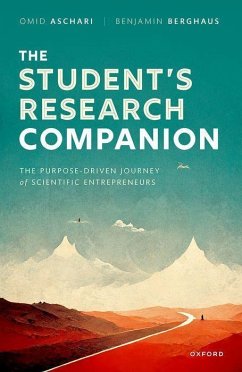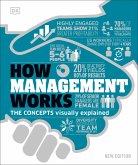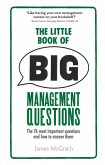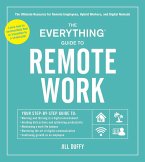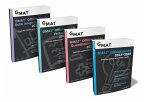Omid Aschari (Associat Associate Professor of Strategic Management, Benjamin Berghaus (Scientific entrepreneur and Scientific Lecturer
The Student's Research Companion
The Purpose-driven Journey of Scientific Entrepreneurs
Omid Aschari (Associat Associate Professor of Strategic Management, Benjamin Berghaus (Scientific entrepreneur and Scientific Lecturer
The Student's Research Companion
The Purpose-driven Journey of Scientific Entrepreneurs
- Gebundenes Buch
- Merkliste
- Auf die Merkliste
- Bewerten Bewerten
- Teilen
- Produkt teilen
- Produkterinnerung
- Produkterinnerung
This book will aim at better understanding, elaborating on, and inspiring the creation of more purpose-driven research. It sees the potential of a thesis to be more than an examination.
Andere Kunden interessierten sich auch für
![Business Student's Handbook, The Business Student's Handbook, The]() Sheila CameronBusiness Student's Handbook, The50,99 €
Sheila CameronBusiness Student's Handbook, The50,99 €![The Visual MBA The Visual MBA]() Jason BarronThe Visual MBA16,99 €
Jason BarronThe Visual MBA16,99 €![How Management Works How Management Works]() DKHow Management Works16,99 €
DKHow Management Works16,99 €![Little Book of Big Management Questions, The Little Book of Big Management Questions, The]() James McGrathLittle Book of Big Management Questions, The16,99 €
James McGrathLittle Book of Big Management Questions, The16,99 €![The Everything Guide to Remote Work The Everything Guide to Remote Work]() Jill DuffyThe Everything Guide to Remote Work16,99 €
Jill DuffyThe Everything Guide to Remote Work16,99 €![GMAT Official Guide 2024-2025 Bundle: Books + Online Question Bank GMAT Official Guide 2024-2025 Bundle: Books + Online Question Bank]() GMAC (Graduate Management Admission Council)GMAT Official Guide 2024-2025 Bundle: Books + Online Question Bank92,99 €
GMAC (Graduate Management Admission Council)GMAT Official Guide 2024-2025 Bundle: Books + Online Question Bank92,99 €![Revision Express AS and A2 Business Studies Revision Express AS and A2 Business Studies]() Barry BrindleyRevision Express AS and A2 Business Studies18,99 €
Barry BrindleyRevision Express AS and A2 Business Studies18,99 €-
-
-
This book will aim at better understanding, elaborating on, and inspiring the creation of more purpose-driven research. It sees the potential of a thesis to be more than an examination.
Hinweis: Dieser Artikel kann nur an eine deutsche Lieferadresse ausgeliefert werden.
Hinweis: Dieser Artikel kann nur an eine deutsche Lieferadresse ausgeliefert werden.
Produktdetails
- Produktdetails
- Verlag: Oxford University Press
- Seitenzahl: 384
- Erscheinungstermin: 20. April 2023
- Englisch
- Abmessung: 163mm x 242mm x 27mm
- Gewicht: 706g
- ISBN-13: 9780192855312
- ISBN-10: 019285531X
- Artikelnr.: 66455926
- Herstellerkennzeichnung
- Libri GmbH
- Europaallee 1
- 36244 Bad Hersfeld
- gpsr@libri.de
- Verlag: Oxford University Press
- Seitenzahl: 384
- Erscheinungstermin: 20. April 2023
- Englisch
- Abmessung: 163mm x 242mm x 27mm
- Gewicht: 706g
- ISBN-13: 9780192855312
- ISBN-10: 019285531X
- Artikelnr.: 66455926
- Herstellerkennzeichnung
- Libri GmbH
- Europaallee 1
- 36244 Bad Hersfeld
- gpsr@libri.de
Professor Omid Aschari is an Associate Professor of Strategic Management and founding Managing Director of the globally respected flagship Master in Strategy and International Management (SIM-HSG) at the University of St. Gallen since its inception in 2003. Dr. Benjamin Berghaus (HSG) is a scientific entrepreneur at the intersection of research, education, and practice in his field. Since 2018, Benjamin has established himself to work a broad portfolio of self- and co-initiated projects geared towards fostering young people at the transition from the academic to the professional phase of their lives.
1 - Approach
1.1: Skills and the will to grow
1.2: Relevance follows audience
1.3: Rigour suggests approach
1.4: Deduce the research design
1.5: Purposeful scientific entrepreneur
1.6: Renewable research energy
1.7: Why even bother?
1.8: Preparation determines motivation
1.9: A peer called supervisor
1.10: Countless shades of supervision
2 - Begin
2.1: Conduct a project
2.2: Follow one trajectory
2.3: Try not to build roof-down
2.4: Build well-dimensioned bridges
2.5: Impression management
2.6: Maturing your mind
2.7: Comparing with others
2.8: A researcher's humility
2.9: Theory is there to help
2.10: Castle under siege
3 - Conduct
3.1: Growing into an expert
3.2: Help others understand you
3.3: Strange birds
3.4: Writing as modern architecture
3.5: A magnetic introduction
3.6: A contextualising theory chapter
3.7: An instructive methodology chapter
3.8: A resolving findings chapter
3.9: A progressive discussion
3.10: A consolidating conclusion
4 - Complete
4.1: Revise frequently
4.2: Core motivator, key critic
4.3: Frustration is a fuzzy teacher
4.4: Relaxation as a research methodology
4.5: Fear of writing
4.6: Mitigating mental overload
4.7: Write like a journey
4.8: Be kind to yourself
4.9: Necessity of ownership
4.10: Throwing off a weight
5 - Continue after
5.1: Take in your accomplishment
5.2: Feedback eats grades for breakfast
5.3: Your degree is a trusted symbol
5.4: Do good for yourself and others
5.5: Keep in touch
5.6: Career serendipity
5.7: Never consider yourself unfree
5.8: Fortify your academic skills
5.9: Grow forward
5.10: Share the fire
1.1: Skills and the will to grow
1.2: Relevance follows audience
1.3: Rigour suggests approach
1.4: Deduce the research design
1.5: Purposeful scientific entrepreneur
1.6: Renewable research energy
1.7: Why even bother?
1.8: Preparation determines motivation
1.9: A peer called supervisor
1.10: Countless shades of supervision
2 - Begin
2.1: Conduct a project
2.2: Follow one trajectory
2.3: Try not to build roof-down
2.4: Build well-dimensioned bridges
2.5: Impression management
2.6: Maturing your mind
2.7: Comparing with others
2.8: A researcher's humility
2.9: Theory is there to help
2.10: Castle under siege
3 - Conduct
3.1: Growing into an expert
3.2: Help others understand you
3.3: Strange birds
3.4: Writing as modern architecture
3.5: A magnetic introduction
3.6: A contextualising theory chapter
3.7: An instructive methodology chapter
3.8: A resolving findings chapter
3.9: A progressive discussion
3.10: A consolidating conclusion
4 - Complete
4.1: Revise frequently
4.2: Core motivator, key critic
4.3: Frustration is a fuzzy teacher
4.4: Relaxation as a research methodology
4.5: Fear of writing
4.6: Mitigating mental overload
4.7: Write like a journey
4.8: Be kind to yourself
4.9: Necessity of ownership
4.10: Throwing off a weight
5 - Continue after
5.1: Take in your accomplishment
5.2: Feedback eats grades for breakfast
5.3: Your degree is a trusted symbol
5.4: Do good for yourself and others
5.5: Keep in touch
5.6: Career serendipity
5.7: Never consider yourself unfree
5.8: Fortify your academic skills
5.9: Grow forward
5.10: Share the fire
1 - Approach
1.1: Skills and the will to grow
1.2: Relevance follows audience
1.3: Rigour suggests approach
1.4: Deduce the research design
1.5: Purposeful scientific entrepreneur
1.6: Renewable research energy
1.7: Why even bother?
1.8: Preparation determines motivation
1.9: A peer called supervisor
1.10: Countless shades of supervision
2 - Begin
2.1: Conduct a project
2.2: Follow one trajectory
2.3: Try not to build roof-down
2.4: Build well-dimensioned bridges
2.5: Impression management
2.6: Maturing your mind
2.7: Comparing with others
2.8: A researcher's humility
2.9: Theory is there to help
2.10: Castle under siege
3 - Conduct
3.1: Growing into an expert
3.2: Help others understand you
3.3: Strange birds
3.4: Writing as modern architecture
3.5: A magnetic introduction
3.6: A contextualising theory chapter
3.7: An instructive methodology chapter
3.8: A resolving findings chapter
3.9: A progressive discussion
3.10: A consolidating conclusion
4 - Complete
4.1: Revise frequently
4.2: Core motivator, key critic
4.3: Frustration is a fuzzy teacher
4.4: Relaxation as a research methodology
4.5: Fear of writing
4.6: Mitigating mental overload
4.7: Write like a journey
4.8: Be kind to yourself
4.9: Necessity of ownership
4.10: Throwing off a weight
5 - Continue after
5.1: Take in your accomplishment
5.2: Feedback eats grades for breakfast
5.3: Your degree is a trusted symbol
5.4: Do good for yourself and others
5.5: Keep in touch
5.6: Career serendipity
5.7: Never consider yourself unfree
5.8: Fortify your academic skills
5.9: Grow forward
5.10: Share the fire
1.1: Skills and the will to grow
1.2: Relevance follows audience
1.3: Rigour suggests approach
1.4: Deduce the research design
1.5: Purposeful scientific entrepreneur
1.6: Renewable research energy
1.7: Why even bother?
1.8: Preparation determines motivation
1.9: A peer called supervisor
1.10: Countless shades of supervision
2 - Begin
2.1: Conduct a project
2.2: Follow one trajectory
2.3: Try not to build roof-down
2.4: Build well-dimensioned bridges
2.5: Impression management
2.6: Maturing your mind
2.7: Comparing with others
2.8: A researcher's humility
2.9: Theory is there to help
2.10: Castle under siege
3 - Conduct
3.1: Growing into an expert
3.2: Help others understand you
3.3: Strange birds
3.4: Writing as modern architecture
3.5: A magnetic introduction
3.6: A contextualising theory chapter
3.7: An instructive methodology chapter
3.8: A resolving findings chapter
3.9: A progressive discussion
3.10: A consolidating conclusion
4 - Complete
4.1: Revise frequently
4.2: Core motivator, key critic
4.3: Frustration is a fuzzy teacher
4.4: Relaxation as a research methodology
4.5: Fear of writing
4.6: Mitigating mental overload
4.7: Write like a journey
4.8: Be kind to yourself
4.9: Necessity of ownership
4.10: Throwing off a weight
5 - Continue after
5.1: Take in your accomplishment
5.2: Feedback eats grades for breakfast
5.3: Your degree is a trusted symbol
5.4: Do good for yourself and others
5.5: Keep in touch
5.6: Career serendipity
5.7: Never consider yourself unfree
5.8: Fortify your academic skills
5.9: Grow forward
5.10: Share the fire

